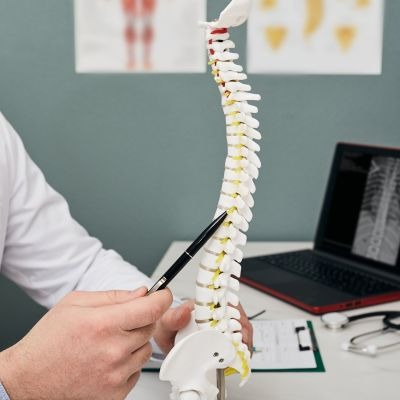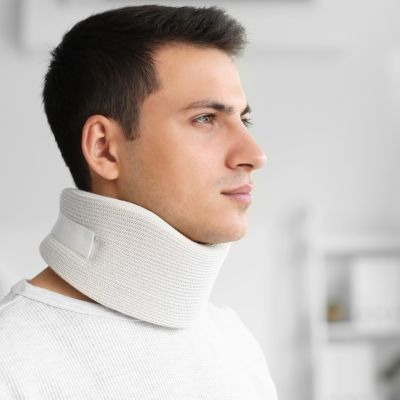Other spinal conditions

There are many different spinal conditions that may affect a person’s comfort or mobility. Some conditions, such as spinal infections or spinal fractures, are less commonly seen but can have a significant impact on function and wellbeing.
Spinal infections
Spinal infections are uncommon but serious conditions that can affect the spine. Also known as vertebral osteomyelitis, they can occur when a bacterial or fungal infection develops in a person’s spine.
The most common cause of a spinal infection is a bacterial infection, particularly Staphylococcus aureus and E. coli. Fungal infections can also be a cause, though this is less common. Factors that may increase the risk of infection include a compromised immune system, diabetes, chronic kidney disease, and intravenous drug use. In some cases, infections may occur following spinal or pelvic surgery.
The symptoms of a spinal infection may develop gradually and can include:
- Persistent back or neck pain
- Difficulty walking or changes in mobility
- Fever or chills
- Fatigue or general unwellness
- Loss of appetite
- Weakness or numbness of the arms or legs
Treatment is tailored to the cause and severity of the infection. In many cases, a course of intravenous antibiotics or antifungal medications is used. Surgical options may be considered if the infection is causing spinal instability, persistent pain or pressure on nearby nerves.


Spinal Fractures (Traumatic Fractures)
A traumatic spinal fracture is a break or dislocation of one or more vertebrae. These fractures can cause severe back pain and may lead to nerve damage or paralysis if left untreated. Traumatic spinal fractures are most often caused by high-impact trauma, such as car accidents, falls from a height or sporting injuries.
Treatment varies depending on the nature of the injury. Some fractures can be managed with rest and the use of a brace. In other situations, surgery may be recommended to realign the bones, relieve pressure on the spinal cord, or stabilise the spine.
Spinal Fractures (Vertebral Compression Fractures)
A vertebral compression fracture (VCF) occurs when a vertebra in the spine collapses. VCFs are the most common type of osteoporotic fracture and are typically seen in older adults with osteoporosis.
A vertebral compression fracture can present with a number of key symptoms. The most common is a sudden onset of back pain that is typically worse when standing and moving, and is often relieved by lying down. This pain may lead to decreased mobility of the spine.
As the condition progresses, it may result in an eventual loss of height and kyphosis, a spinal deformity which can lead to a curvature or “hunch” in the upper back.
Treatment depends on the severity of the fracture and the presence of any neurological symptoms. In some cases, a period of rest and pain medication may be sufficient.
In other cases, minimally invasive surgical options, such as vertebroplasty and kyphoplasty, may be considered to support recovery and help manage symptoms.
The benefits and potential risks of surgery are carefully considered in each case and will be discussed with the patient in detail.

How can we help?

Disclaimer
All information is general and not intended as a substitute for professional advice. Macquarie Neurosurgery and Spine can consult with you regarding your individual health needs. Any surgical or invasive procedure carries risks.
References
- Cleveland Clinic, Vertebral Osteomyelitis, https://my.clevelandclinic.org/health/diseases/22276-vertebral-osteomyelitis, Accessed 8 September, 2025.
- Mayo Clinic, Staph infections, https://www.mayoclinic.org/diseases-conditions/staph-infections/symptoms-causes/syc-20356221, Accessed 8 September, 2025.
- Healthline, E. coli infection, https://www.healthdirect.gov.au/e-coli-infection, Accessed 8 September, 2025.
- Cleveland Clinic, Fractured Spine (Vertebrae), https://my.clevelandclinic.org/health/diseases/17498-spinal-fractures, Accessed 8 September, 2025.
- Cleveland Clinic, Compression Fractures, https://my.clevelandclinic.org/health/diseases/21950-compression-fractures, Accessed 8 September, 2025.
- John Hopkins Medicine, Kyphosis, https://www.hopkinsmedicine.org/health/conditions-and-diseases/kyphosis, Accessed 8 September, 2025.
- Mayo Clinic, Vertebroplasty, https://www.mayoclinic.org/tests-procedures/vertebroplasty/about/pac-20385207, Accessed 8 September, 2025.
- Cleveland Clinic, Kyphoplasty, https://my.clevelandclinic.org/health/procedures/kyphoplasty, Accessed 8 September, 2025.
